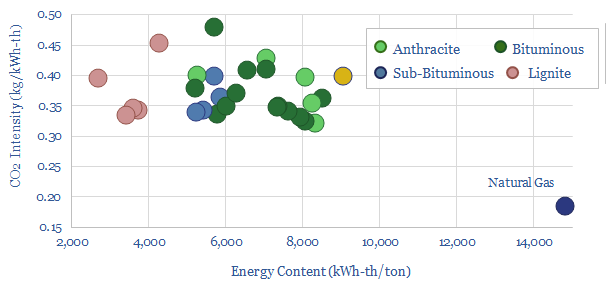What is the CO2 intensity of coal? To answer this question, we have aggregated data on twenty five coal samples, across different countries, grades and technical papers. Sampled countries include China, Indonesia, Mongolia, Germany, Poland, the US, Canada, Australia, Japan and Korea.
The coal grades in the data file span across petcoke, anthracite, bituminous coal, sub-bituminous coal and lignite. All of these are classified as “coal”. Although their chemical and physical properties vary vastly.
The average coal grade in our data-file consists of 63% carbon, 30% volatile components that will gas out when coal is heated, 12% moisture (i.e., water) and 12% ash. (Note that the numbers do not add to 100% because some of the volatile components include hydrocarbons, including methane, which in turn contain carbon). Again these properties vary widely, from anthracites with >5% moisture to lignites and peats with over 50%.
The average energy content is 6,250 kWh/ton, within a range of 3,000 kWh/ton to 9,000 kWh/ton. This is mostly determined by the amount of carbon in the coal grade, which in turn will determine its CO2 emissions. CO2 intensity can then be calculated by dividing CO2 emissions (in kg) by energy content (in kWh).
The typical CO2 intensity of burning coal is estimated at 0.37 kg/kWh, looking across these twenty-five examples, with a straight line average. The range is approximately 0.3 – 0.5 kg/kWh. This is consistent with the CO2 intensity range given by the IPCC, which comes out around 0.35 kg/kWh.
The CO2 intensity of coal depends mostly upon the mineral composition of the coal sample, and appears to vary, sample by sample, with little underlying pattern. Strictly, for a full-cycle CO2 intensity calculation, we should also add in the CO2 intensity of producing, processing and distributing coal, i.e., Scope 1-2 CO2 intensity. And then we must also adjust for different fuel’s efficiency factors.
The data support the conclusion that coal is approximately 2x more CO2 intensive per unit of thermal energy than natural gas, where CO2 intensity is around 0.19kg/kWh. This is consistent with our analysis of bond enthalpies and energy units and conversions.
